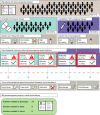Predicted efficacy of a pharmacogenetic passport for inflammatory bowel disease
- PMID: 32363635
- PMCID: PMC7318341
- DOI: 10.1111/apt.15762
Predicted efficacy of a pharmacogenetic passport for inflammatory bowel disease
Abstract
Background: High inter-individual variability in therapeutic response to drugs used in the management of Inflammatory Bowel Disease (IBD) leads to high morbidity and high costs. Genetic variants predictive of thiopurine-induced myelosuppression, thiopurine-induced pancreatitis and immunogenicity of Tumour Necrosis Factor alpha (TNFα) antagonists have been identified, but uptake of pre-treatment pharmacogenetic testing into clinical guidelines has been slow.
Aim: To explore the efficacy of a pharmacogenetic passport for IBD that includes multiple pharmacogenetic predictors of response.
Methods: Patients with IBD exposed to thiopurines and/or TNFα antagonists were retrospectively evaluated for the presence of thiopurine toxicity and/or immunogenicity of TNFα antagonists. All patients were genotyped using both whole-exome sequencing and the Illumina Global Screening Array. An in-house-developed computational pipeline translated genetic data into an IBD pharmacogenetic passport that predicted risks for thiopurine toxicity and immunogenicity of TNFα antagonists per patient. Using pharmacogenetic-guided treatment guidelines, we calculated clinical efficacy estimates for pharmacogenetic testing for IBD.
Results: Among 710 patients with IBD exposed to thiopurines and/or TNFα antagonists, 150 adverse drug responses occurred and our pharmacogenetic passport would have predicted 54 (36%) of these. Using a pharmacogenetic passport for IBD that includes genetic variants predictive of thiopurine-induced myelosuppression, thiopurine-induced pancreatitis, and immunogenicity of TNFα antagonists, 24 patients need to be genotyped to prevent one of these adverse drug responses.
Conclusions: This study highlights the clinical efficacy of a pharmacogenetic passport for IBD. Implementation of such a pharmacogenetic passport into clinical management of IBD may contribute to a reduction in adverse drug responses.
© 2020 The Authors. Alimentary Pharmacology & Therapeutics published by John Wiley & Sons Ltd.
Figures

Comment in
-
Editorial: is pharmacogenetic testing for adverse effects to IBD treatments ready for roll-out?Aliment Pharmacol Ther. 2020 Sep;52(6):1076-1077. doi: 10.1111/apt.16025. Aliment Pharmacol Ther. 2020. PMID: 33119171 No abstract available.
References
Publication types
MeSH terms
Substances
LinkOut - more resources
Full Text Sources
